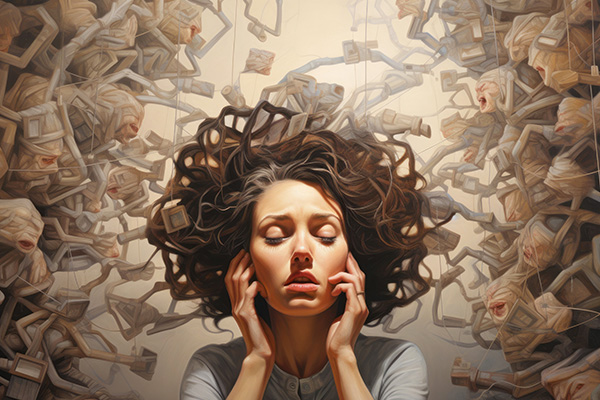The Inner Truth Of External Clutter
 We are almost a month into the new year, the time when most people begin to flounder in their resolutions. For me, resolutions are like empty promises, so my only resolution every New Year is to not make any resolutions.
We are almost a month into the new year, the time when most people begin to flounder in their resolutions. For me, resolutions are like empty promises, so my only resolution every New Year is to not make any resolutions.
Instead, I try to simply live my life with a few consistent rules. I have found that staying true to these personal and lifestyle guidelines eliminates the need for major resolutions each New Year.
Clutter is a big one for me. I make it a point to clean out the clutter in my life on a regular basis, whether it is physical, material, emotional, or spiritual.
Material clutter is the easiest to deal with because it is tangible and visible. It is hard to ignore a pair of shoes that you never wear anymore and have to move around in your closet over and over again.
It is also hard to ignore all those old clothes from another era that you have held on to in the hope that one day they will come back in style. Equally difficult to deal with are those old spice jars and other pantry items past their expiration date that you should have thrown away years ago!
These small lifestyle annoyances may seem insignificant on the surface until you consider that material clutter goes hand in hand with mental, emotional and spiritual clutter. The way we live, the way we manage our environment, and the way we organize our outer existence are a reflection of our inner being. The resulting clutter then becomes a recurring pattern that leads to more clutter, chaos, and dysfunction in our lives.
When we throw out the physical clutter, we clear our minds. When we throw out the mental clutter, we clear our souls ~ Gail Blanke
Mental Clutter
Living in a cluttered environment is often a symptom of increased stress and anxiety. The chaos and disorganization reflect a loss of focus or a feeling of being overwhelmed. Sometimes we clutter because we struggle with decision making in general and may postpone or avoid making decisions about what to keep or discard. Constant exposure to the resulting clutter then leads to even more mental stress, mental fatigue, and reduced cognitive performance and overload.
Emotional Clutter
Clutter is often the result of forming strong emotional attachments to an object because we associate it with happy memories or sentimental value. Difficulty letting go of these items can contribute to clutter. We fear that discarding an item will result in losing a part of ourselves or our past. Emotional health issues, such as depression or anxiety, also contribute to cluttering as a way to cope with emotional distress.
Clutter can also be a response to loss or grief. Holding onto things serves as a way to fill emotional voids or provide a sense of security. People who have experienced intense trauma may also collect clutter as a means of creating a protective barrier or as a response to feeling out of control.
Another way that emotional clutter manifests materially is in our physical health. For example, I have been practicing and teaching Reiki for many years. I have worked with several clients who have had childhood emotional trauma surface as physical problems. The person with the knee problem was afraid to move forward. The person with the shoulder problem was carrying the weight of the world. The inner child of a person with heart issues had a broken heart from childhood abuse. As we began to work on these emotional issues, the pain began to dissipate.
What I know for sure is that when you declutter – whether it’s on your home, your head, or your heart – it is astounding what will flow into that space that will enrich you, your life, and your family ~ Peter Walsh
Spiritual Clutter
Clutter also tends to result from a sense of spiritual disconnection. Spiritually healthy people who are in tune with their inner being and their higher power tend to prefer clutter-free living because it is more conducive to mindfulness, conscious living and a sense of presence. A cluttered environment disrupts the flow of energy and hinders personal and spiritual expansion and psychic well-being.
It is no coincidence that several spiritual traditions and esoteric lifestyle practices emphasize simplicity, mindfulness, and a clutter-free lifestyle. These practices are known to foster a sense of inner peace, presence, and connection:
Minimalism: Minimalism encourages individuals to live with only the essentials and eliminate excess possessions. This practice fosters a sense of freedom, clarity, and focus on what really matters.
Feng Shui: Feng Shui is an ancient Chinese practice of arranging one’s environment to optimize the flow of energy (chi). Decluttering and organizing spaces is central to this practice, as it is believed to promote positive energy and balance.
Zen Buddhism: Zen teachings emphasize mindfulness and being fully present in the moment. Practitioners often simplify their surroundings to reduce distractions and cultivate a clear, focused mind.
Wabi-Sabi: Wabi-Sabi is a Japanese aesthetic that finds beauty in imperfection and values the transience of things. Embracing the impermanence of possessions can lead to a more relaxed attitude toward clutter.
Buddhist Non-Attachment: Buddhist teachings often emphasize non-attachment to material possessions. Practitioners cultivate an awareness of impermanence, which can reduce the desire to accumulate unnecessary items.
The KonMari Method: Developed by Marie Kondo, the KonMari Method encourages individuals to keep only those possessions that “bring joy. This method involves decluttering and organizing based on emotional connections to items.
The Simplicity Movement: The simplicity movement advocates a lifestyle that emphasizes quality over quantity. It involves making conscious decisions to simplify one’s life, including decluttering possessions and reducing materialistic pursuits.
Jain Non-Possession: Jain philosophy advocates non-possession and detachment from material things. This perspective encourages adherents to minimize material pursuits and focus on spiritual growth.
You don’t have to face every skeleton in your closet before you can make some room in there! ~ Carmen Klassen
Improving your living environment by decluttering and organizing will have a positive impact on your mental, emotional, and spiritual well-being, and vice versa. It will give you a sense of control, create a more peaceful atmosphere, and contribute to a healthier overall lifestyle.
You may not know where to begin. Do you clean out the closets first, or do you start seeing a therapist or join a mental health support group, or do you start a new spiritual practice routine? In my experience, it does not matter too much which category of clutter you tackle first. I think one should start with whatever feels easiest or more within reach, because improvement in one type of clutter will automatically lead to improvement in the other. Just start with something to break the clutter cycle or disrupt the energy pattern.
Baby steps are important. Once you have accomplished some succes with one aspect of clutter in your life, pat yourself on the back and move on to the next. Remember to thank Spirit for helping you and staying by your side no matter what.
Decluttering your heart, mind and spirit is a process. It takes a lot of self-work and self-compassion to clear the stuff that builds these inner and outer walls, but in the end it is 100% worth the effort. Feeling free and hearing clearly what Spirit has to say to you is priceless.
|
|

Leave a Reply